Says she!!! Whose arrival at Delphi, in the late morning, clashed beautifully with the day tours from Athens!
I’ve very little to add to everything that has already been published about Delphi – it IS special, and well worthy of a visit. This is just a nod to anyone considering independent travel in Greece next summer.
The most popular day tour from Athens is…..an excursion to Delphi!. Allowing 2.5 – 3.0 hours either by tour bus or public service, you can just imagine the hordes that arrive from mid morning onwards and continue nonstop until mid afternoon.
What WE did –
We left Olympia on the Peloponnese around 8.00am and drove 3.5 hours to Delphi, had lunch in town and then visited the site. After the relative emptiness of the Peloponnese sites, it was heart dropping stuff to join the queue at the entrance. Once inside, we shuffled along, circumventing groups of visitors clustered around their tour guide and all blocking the pathways.
And this was JUNE – I shudder to think of high season!
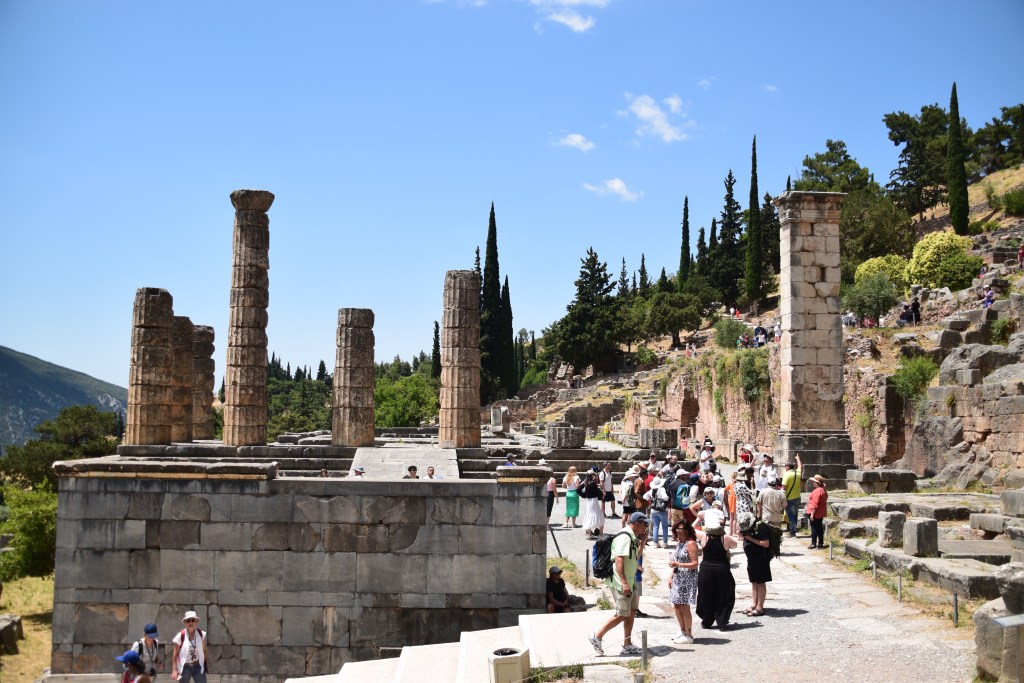
What we should have done!
Those on a day trip have very few options but we could have planned differently….. We could easily have driven from Olympia the previous evening. The town of Delphi isn’t the worst on the planet and an overnighter there would have set us up nicely for the following morning – we could have enjoyed the site before the busloads arrived.
So there! Message imparted!
Now -about Delphi…….
Prime Real Estate this place!!! Even the Gods fought for a piece of it! Zeus released two eagles – one to the east and one to the west – their point of meeting would be the centre of the world. They met here, on the slopes of Mount Parnassós, where Zeus marked the spot with the omphalos (navel) stone.
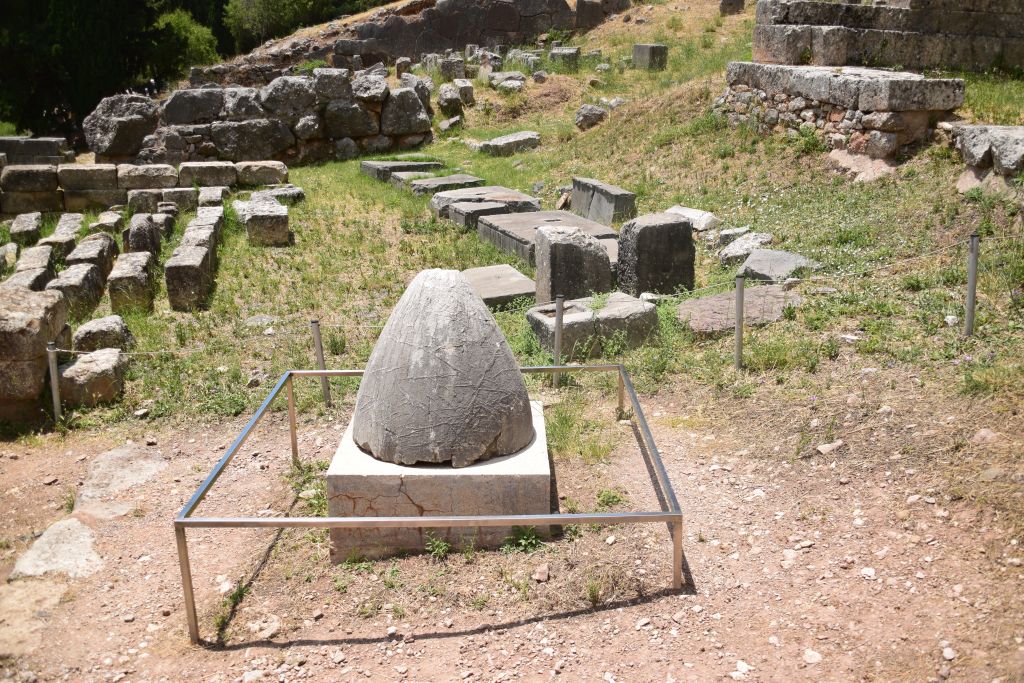
The place was sacred to Gaea, mother goddess of the earth. Small local settlements dedicated themselves to her and she left her son Python, a serpent, here as guard.
Apollo fancied the site for himself and, after arriving on the back of a dolphin (Delphi derives from the word dolphin), he slew the serpent right at the site of the omphalos.
From then, the priestesses who served him were called the Pythia in honour of Gaea’s son.
The worship of Apollo was established between 11th – 9th c. B.C. and the site was to become internationally known for its oracular consultations.
It was believed that the priestess – or Pythia – channeled prophecies from Apollo himself. She would answer questions put to her by visitors wishing for guidance.
Access to the Pythia was restricted, to say the least! Firstly, she operated only on one day per month – for 9 months of the year (it was believed that Apollo took off to warmer climes for the winter months!!). Then, it had to be determined whether Apollo actually wanted to be consulted on that particular day – cold water was sprinkled on a sacrificial goat and a shuddering animal meant that Apollo was good to go and the day could proceed as planned. After lengthy acts of purification and sacrifice, the Pythia was finally ready for the first visitor. There was always a long queue, each member having purified themselves in nearby spring water and offered money and sacrificial cake. Delphians went first, then Greeks, and finally non-Greeks (although great sums of money were paid by some in order to skip the queue!). They came as individuals, with questions about marriage, jobs and health; or, on behalf of a city state, consulting about the major issues of the day, be it warfare, colonies or law and order. Such was the belief in the Oracle throughout the Greek world that no major decision was made without consultation (one reason for its power was its perceived independence – it wasn’t attached to the powerful city states of Athens, Sparta and Corinth – its neutrality making it accessible to all).
Meanwhile, sitting on a tripod, the Pythia muttered incomprehensibly whilst in a gas induced, trancelike state. The priests of the sanctuary interpreted these divine words of advice and delivered them to those awaiting with bated breath. The oracles were famously ambiguous and always open to interpretation. But that was ok – it was accepted that divine words would be unintelligible to mere mortals!
‘You will go you will return not in the battle you will perish‘ is a wonderful example, its interpretation dependent on the placement of a comma. If the comma is after the word not, it doesn’t auger well for the poor soul heading to war! If, on the other hand, the comma is placed before the same word, then the warrior can look forward to a successful outcome!
The Oracle did not appreciate manipulation or vanity – Croesus, the wealthy king of Lydia, tested the Oracle by asking her what he was doing at a particular point in time. The Oracle correctly replied in great detail. Satisfied by this accuracy, Croesus then asked if he would be successful in war against Persia. The Oracle replied that Croesus would ‘destroy a great empire.’ Arrogantly, Croesus assumed victory. Of course, the great empire was actually his own and he was soon enslaved by the Persians!
Thanks to the many very generous donations and gifts it received from hopeful and grateful supporters, Delphi grew in wealth and importance. The city states vied with each other in building commemorative monuments which would reflect their respective power and glory (Croesus himself gave a solid gold lion statue as well as gold and silver bowls – presumably before he was defeated in battle!). Visitors were greatly impressed with the ever growing number of temples, sanctuaries, marble sculptures, stoas and treasury buildings that lined the way.
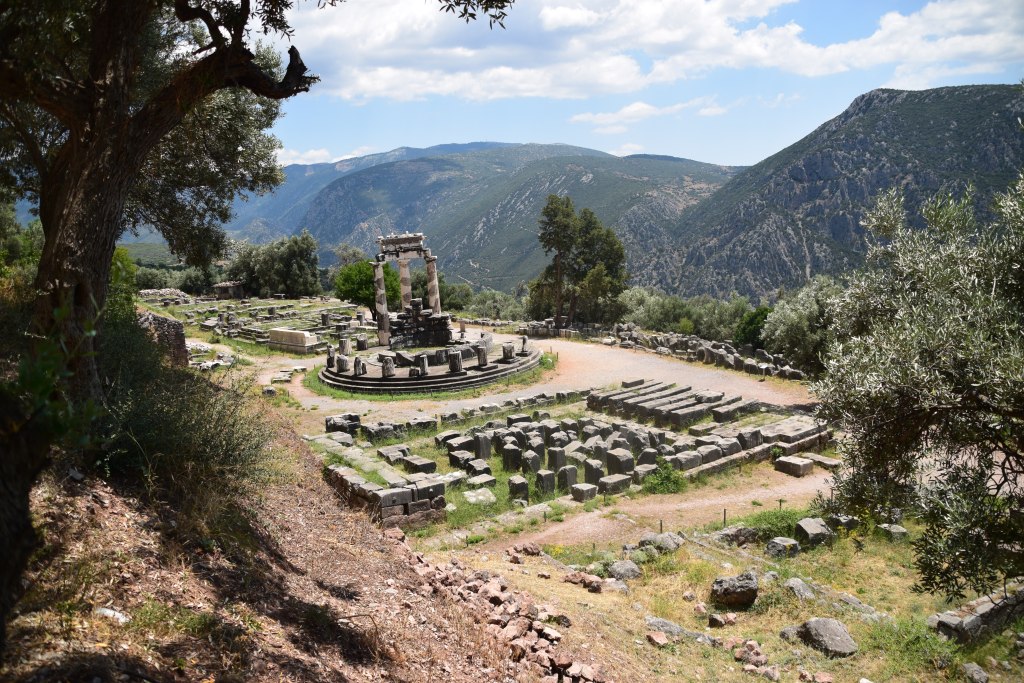



Around 590 BC the first Pythian Games were held in honor of Apollo. Held every four years, these games were second only to those at Olympia and included the usual athletic events as well as poetry and musical contests.
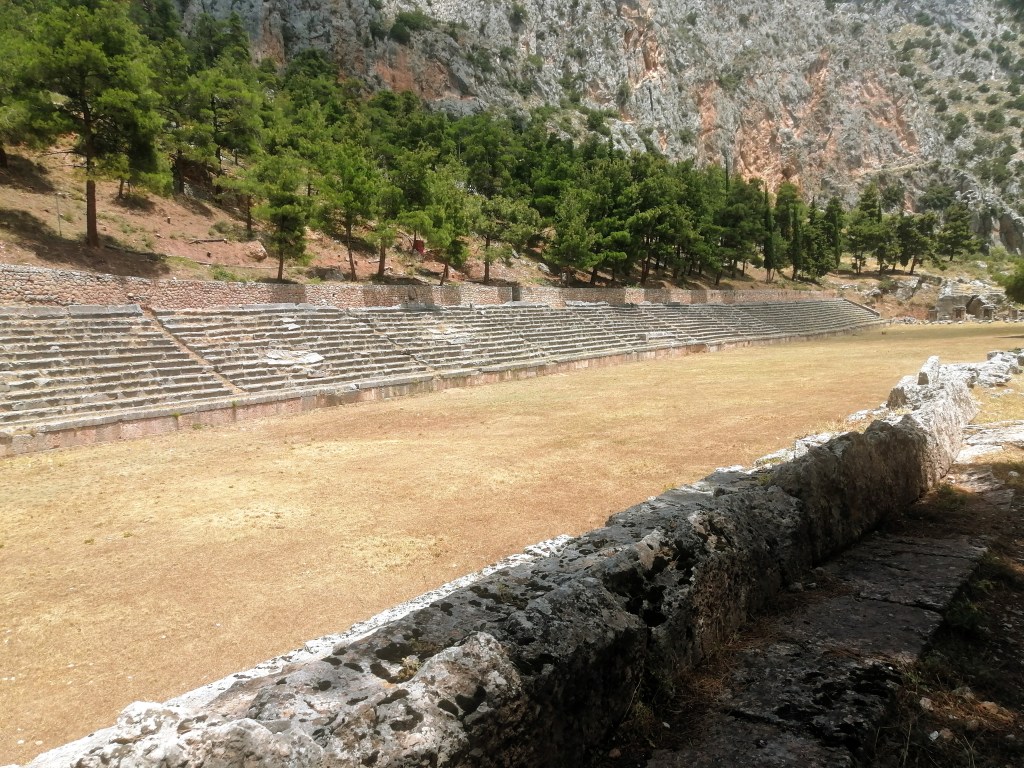
In 470 BC, Hieron, a tyrant of Syracuse, won the chariot race at the Games. He dedicated a life-size bronze chariot complete with four horses and a charioteer. The charioteer is one of the artifacts that can be viewed in the site museum.
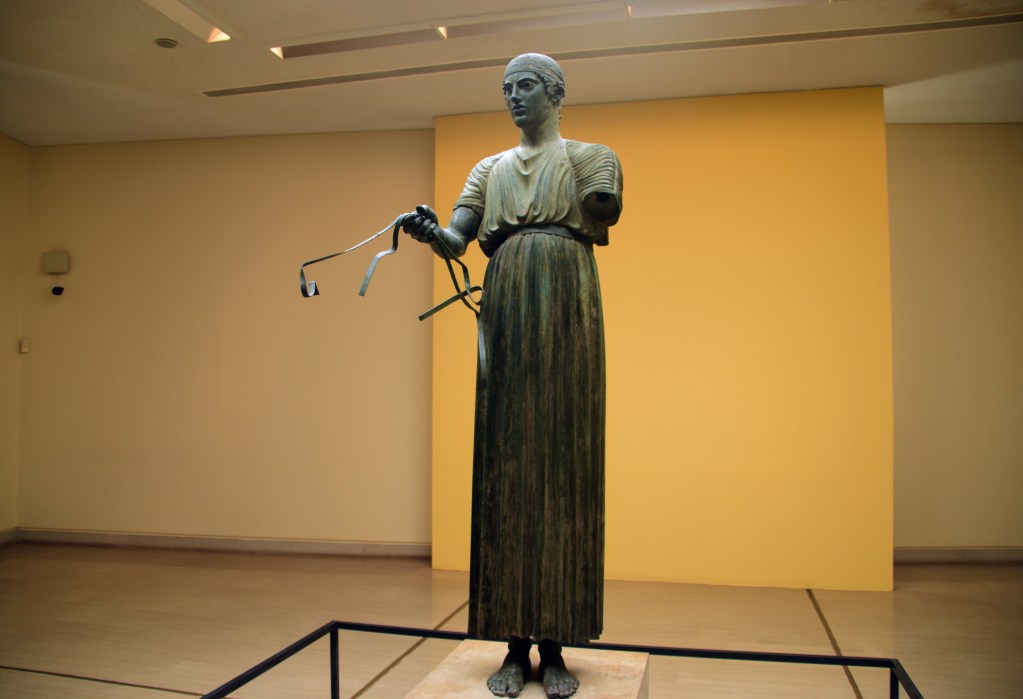
Its status as a sacred site didn’t entirely protect Delphi from attack and pillage. Down through the centuries it fell under the control of successive invaders – some more tolerant than others. It the end, it was the rise of Christianity and a ban on pagan practices that brought about its decline and the city gradually lost its influence and eventually fell to decay.
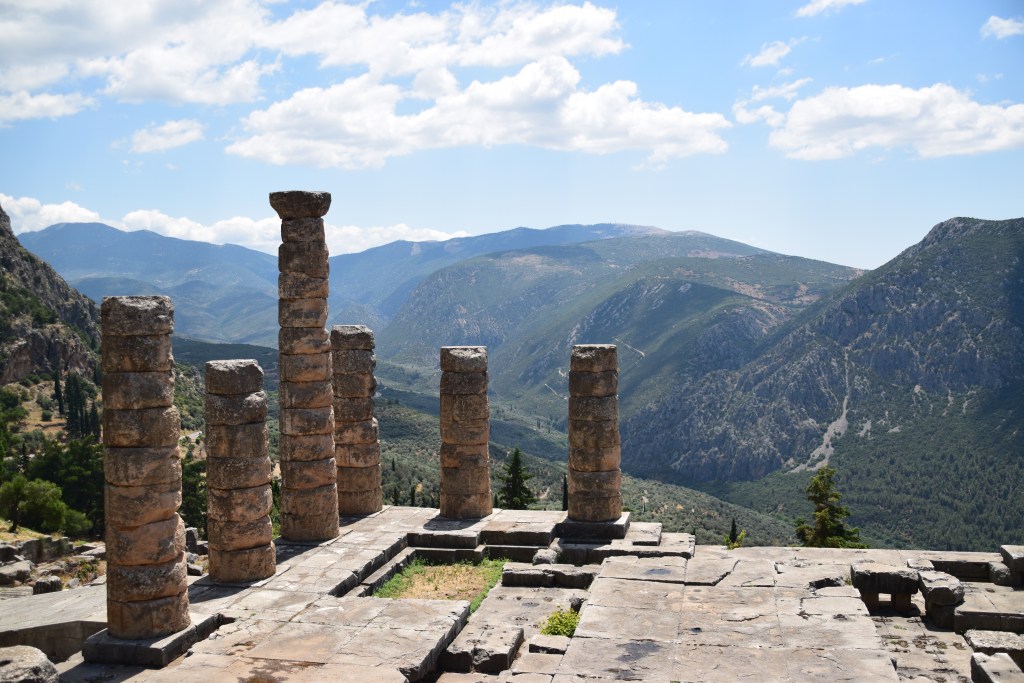
The first modern excavations were carried out in the 1880’s by a team of French archaeologists.
Delphi was designated a UNESCO World Heritage site in 1987.
Note
This was part of a 17 night trip to mainland Greece which included:
Athens
Delphi
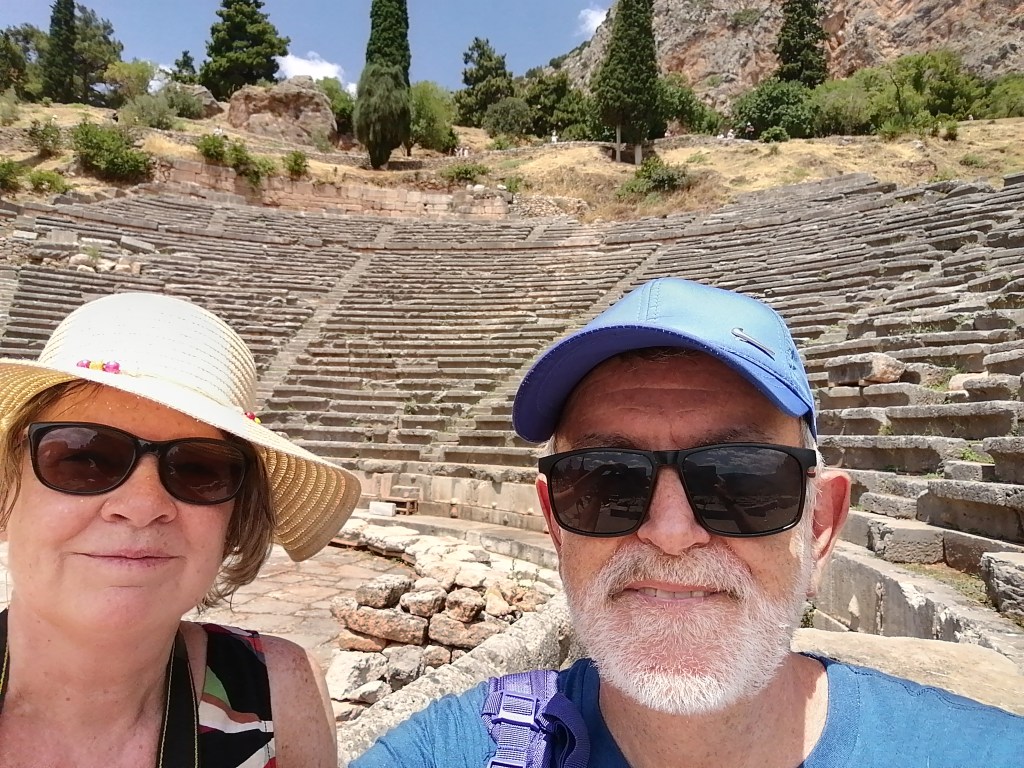

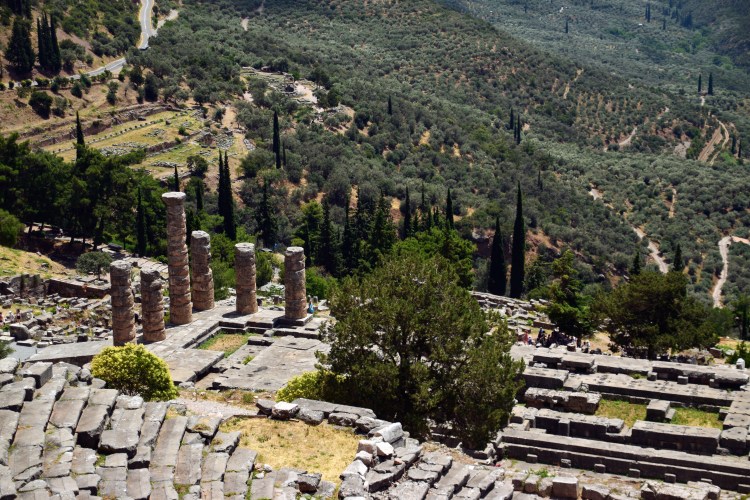
Wonderful pictures and description.
Thank you – glad you enjoyed…..XXXXMarie
Ah, Delphi. We posted quite extensively from here as it is such a stunning, awe inspiring place, not least because of its amazing natural setting. What views! It must have been one hell of a commanding city in its heyday. Great to re-live it through your post. We were lucky (if that’s the right word) to visit summer 2021, so crowds and tourists were still in severely limited numbers.
Anyone who managed to get away that summer has been truly spoiled for life! We managed to visit Cordoba and Alhambra in Grenada that August – No big crowds in Granada and practically had Cordoba to ourselves!
It looks so beautiful! We like traveling in the shoulder season to avoid crowds, but at some spots they’re unavoidable. I try to remember I’m on vacation trying to have fun and some patience.
I think I’ve spent half my life queuing! The longest, off the top of my head, was 3 hours outside the Uffizi in Florence – pre online booking days of course! But it’s all part of the experience isn’t it. At the other end of the spectrum, we visited Legoworld in California one October – no queues so the 3 of us whizzed through everything – but missed the buildup and anticipation that queuing actually adds to the occasion.
We went in January and had it completely to ourselves apart from two locals, so that was good 🙂
What was it like weatherwise? – I’d never have thought of going at that time of year…
We were there in the late 90’s in February and we just happened to pick a weekend when Athens and surrounding area had a mini heatwave. Naturally, for a weekend in February I’d packed only warm clothing but so hot was it that i had to buy a cotton blouse – no tee shirts available at that time! We virtually had the place to ourselves which was marvellous. Ah, memories!
What are the odds of a heatwave in Feb – which would be wonderful if you’ve the right apparel for it! I’d never have thought of Greece in Feb – but with good weather and no crowds – just perfect!
This was an amazing place we explored. Such a wonderful site you visited. Anita
Meteora and Delphi were really the 2 places we most wanted to see so we came away happy!
Stunning spot. Wow you saw a lot.
We really did!!! It was a great trip..
Delphi is wonderful! I am lucky to have visited it a long time ago, and on a day without much crowd
So glad we finally got to visit…..